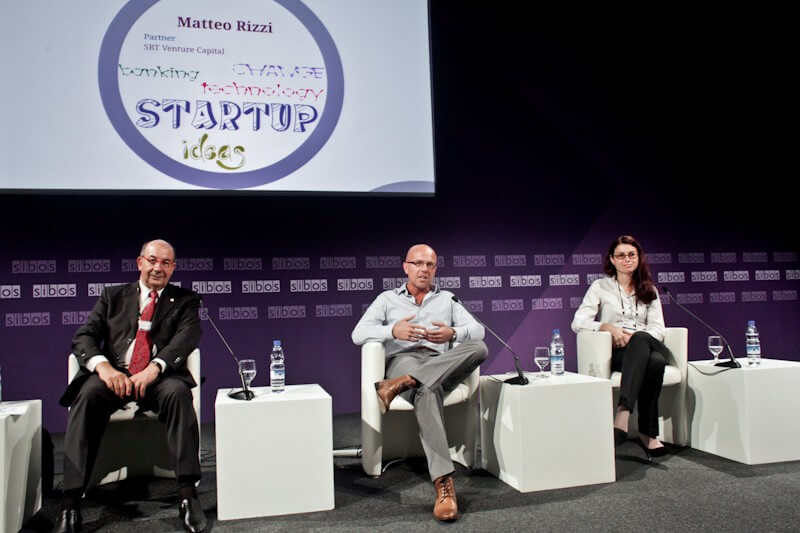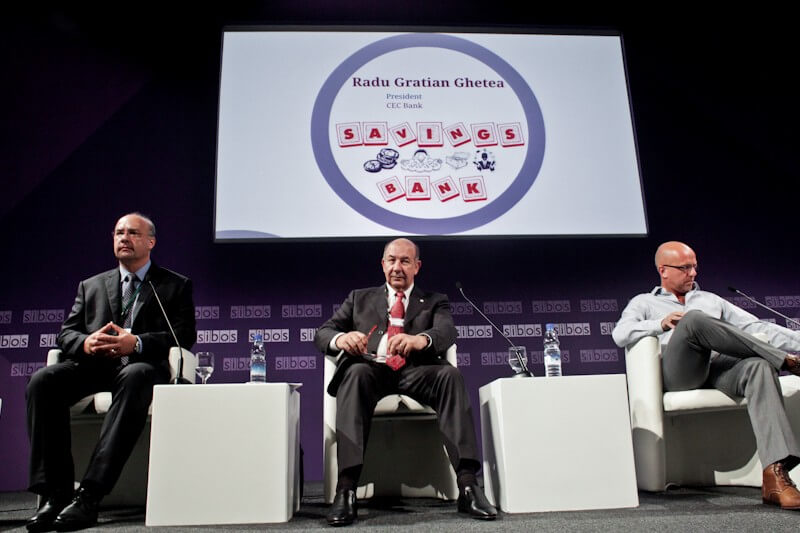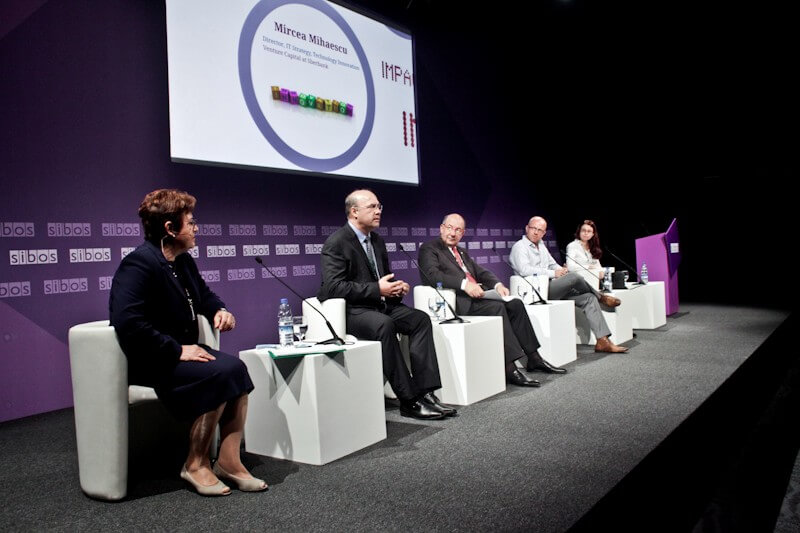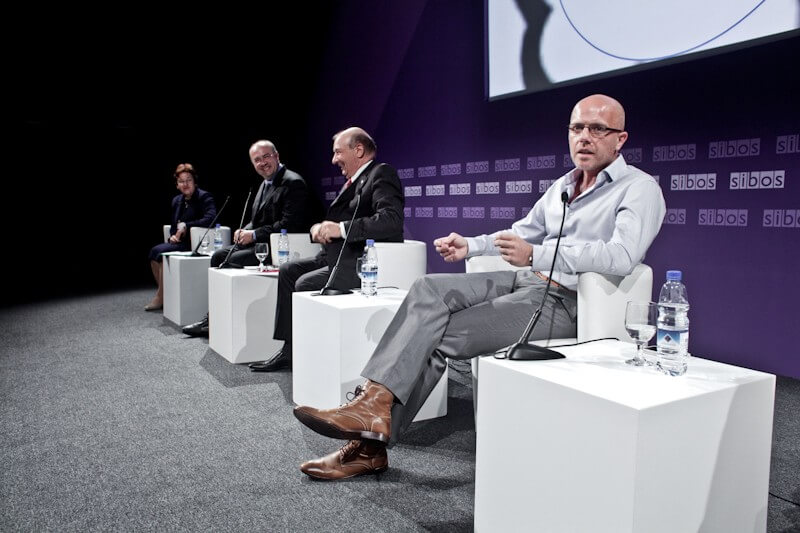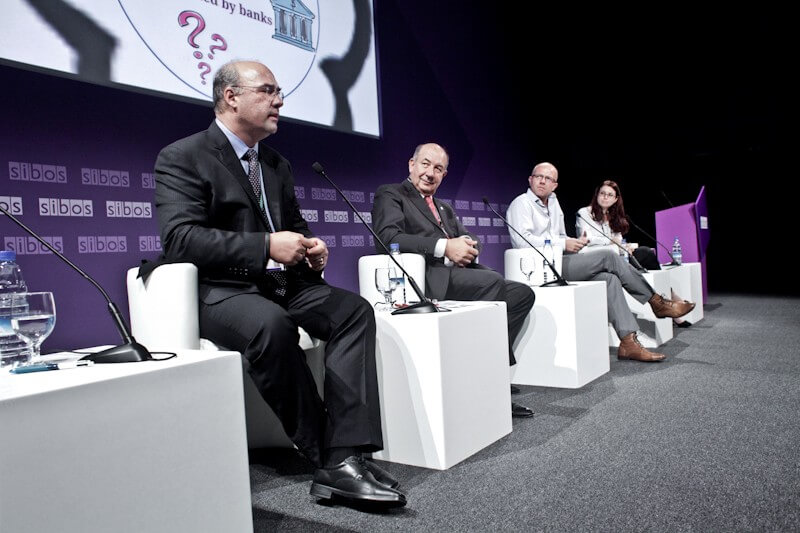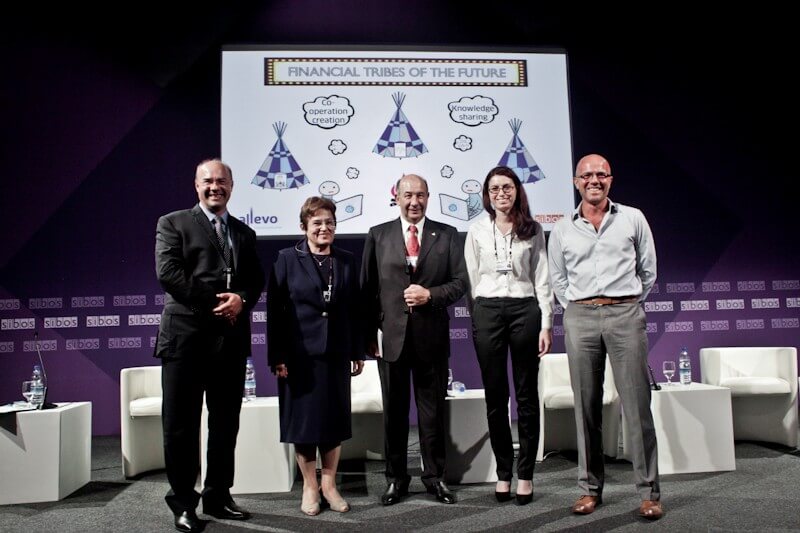Tuesday, September 17, 2013
9:30 in the morning today and we began talking about the Financial Tribes of the Future in Community Room 3. Guess the topic appeals to many, as we enjoyed the biggest crowd ever at an Allevo session at Sibos. Not to mention having such experienced speakers in the panel with such valuable opinions and ideas was a big plus; listening to them is simply time well spent.
With Mircea Mihaescu – Director of the Sberbank Technology Research Center in Moscow (@MirceaMihaescu), Matteo Rizzi – Partner SBT Venture Capital (@matteorizzi), Radu Ghetea – President & CEO of CEC Bank, our own Corina Mihalache – Director Business Analysis in the panel and Rodica Tuchila, Director at the Romanian Banking Association moderating the session, the discussion sparkled with great ideas, intelligent remarks and humorous intervensions.
They looked for answers to questions like: What’s the impact of technological evolution on financial infrastructures? How will the demand-supply chain take shape and how will trade be financed? How do you assess the future of payments intermediated by banks or financial institutions? What do you believe will be the cooperation respectively the competition space? How do you perceive knowledge and assets sharing? Will people gather in tribes or rather more evolved and regulated packs?
Not to lose the actual flavour of the event and the ideas presented, I decided to share with you some of the most interesting quotes from our panelists:
Matteo Rizzi: “First time after 12 years I will speak for a different company in a panel.” Thank you for joining Matteo.
Radu Ghetea: “The banking system should be reengineered, the key is technology. Something should always stay in banking: lending.”
Mircea Mihaescu: “All players do lending using new technologies. We cannot rely on governments to always help out.”
Radu Ghetea: “The future is very challenging and we should reinvent the banking business by creating the environment bringing trust back.”
Mircea Mihaescu: “Prepping coffee takes 10% of the time, 90% is ordering & paying. The future is already here, it’s not widely deployed.” And continuing on that example: “The Starbucks guy should know me, I don’t have to carry cash.” The conclusion: “Payments will disappear in the background, they’ll be like wifi.”
Matteo Rizzi: “The number of banks that have crowd* or co* in their title has exploded in the past years.” Even though, “it took 3 weeks for a bank to give me my credit card, if they googled they would have had 85% of the info the bank asked.”
Mircea Mihaescu on cooperation vs competition: “We collaborate today using tools coming from technology vendors. We need to collaborate explicitly. ”We live in a same apartment building, we share the same door and we need to share the same trust.”
Matteo Rizzi: “There are spaces that cannot move forward without collaboration – trust for example.”… “out of trust you can create services and this should give banks another view of what’s coming to disrupt.”
Corina Mihalache: “Payments and all processing of financial transactions are a commodity, financial institutions should not reinvent the wheel for every technology that they use. The competition should be at the end customer and not at the back office of the banks.”
And on sharing knowledge…
Matteo Rizzi: “The problem of shared knowledge comes from the banks themselves. Companies need to become connected companies before sharing.”… “Skills are spreadsheets in HR but not available to people who need to deploy projects.” “Knowledge tends to travel way waster and be there to be used. Large banks conglomerate through mergers and acquisitions.”
On the same concept, which is the core of our initiative to create an open source platform for financial transactions processing (our FinTP project), Corina Mihalache simply said “We have a dream.” “We started building a business and community to share our product. If anyone else has done it before, share it!”
Radu Ghetea: “Allevo has been talking about open solutions for some years now. Banks should cut on expenses, they need to think twice before investing in new technology. Open solutions are welcome.”
Mircea Mihaescu: “It is safer to use open source algorithms for encryption of security systems. Allevo puts banking in the OS domain.”
And coming up to the tribes:
Mircea Mihaescu: “Definitely people will tend to connect in smaller tribes, in value groups to serve their interest and their passion.”
Radu Ghetea: “It should be a normal thing to gather and brainstorm as often as possible.”
And Matteo and Corina are “definitely for tribes!”.
I especially liked when Mircea Mihaescu said “I drink coffee, I’m in that tribe; I love skiing, I’m in that tribe; I’m in banking, I’m in that tribe.”
At the end, the Q&A session spread for so long that they had to kick us out of the community room, cause they had no time left to prepare it for the next session.
I could not end this post without thanking Chris Skinner for attending our session and especially for writing an entire article on his blog about Financial Tribes of the Future. We liked it so much, that we also posted it on our blog.
On @A11evo you can find all the tweets with more quotes and impressions from the session.
And you can checkout the entire set of photos from the session here.
By Alexandru Vinogradov, 17 September 2013.











